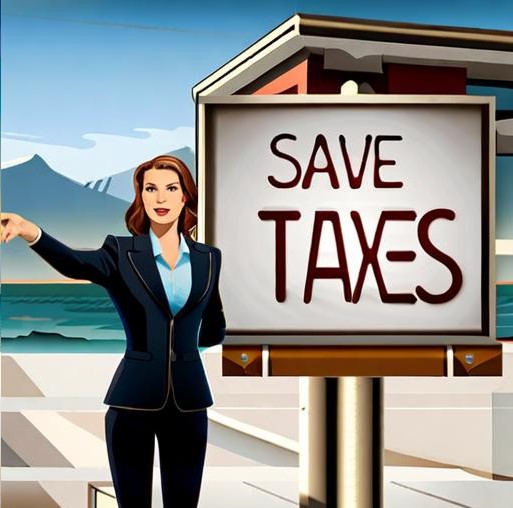Tax Avoidance to Tax Savvy: Outstanding Guide to Becoming a Smart Taxpayer
Do you need help understanding and managing your taxes? Look no further! This comprehensive guide will help you transform from a tax avoidance amateur to a tax-savvy superstar. Whether you are an individual taxpayer or a business owner in the United States, navigating the complex world of taxes can be daunting. But fear not! We are here to demystify the process and provide you with expert tips and strategies to become an intelligent taxpayer.
Understanding tax avoidance and Tax savvy

Tax avoidance is the act of minimizing your tax liability through legal means. It means taking advantage of deductions, credits, and other provisions in the tax code to reduce the amount of Tax you owe. While tax avoidance is perfectly legal and encouraged by the government, it is essential to distinguish between tax avoidance and tax evasion. Tax evasion is the illegal act of intentionally evading taxes by hiding income or providing false information to the tax authorities.
Becoming Tax savvy means understanding the intricacies of the tax system and using that knowledge to your advantage. It means staying informed about changes in tax laws, exploring tax planning strategies, and taking steps to optimize your tax return. By becoming Tax savvy, you can ensure you are not paying more taxes than necessary and maximize your tax savings.
The importance of being an intelligent taxpayer
Being an intelligent taxpayer has numerous benefits. First, you can avoid costly mistakes and penalties by understanding the tax system and your obligations as a taxpayer. The Internal Revenue Service (IRS) has given stringent guidance, and failure to obey can result in fines, interest, and legal consequences. Being an intelligent taxpayer can minimize the risk of attracting unwanted attention from the IRS and ensure you are lawfully fulfilling your obligations.
Secondly, being an intelligent taxpayer allows you to take control of your financial situation. By optimizing your tax return and minimizing your tax liability, you can increase your disposable income and have more funds available for other financial goals. Additionally, being Tax savvy can help you make more informed financial decisions. By understanding the tax implications of various financial choices, such as investments or business decisions, you can make choices that align with your overall financial objectives.
Lastly, being an intelligent taxpayer contributes to the overall functioning of the tax system. Taxes play a crucial role in funding public services and infrastructure. By fulfilling your tax obligations responsibly, you are contributing to the well-being of your community and helping to ensure that essential services are adequately supported.
Key tax terms and concepts
Before diving into the strategies and techniques for becoming an intelligent taxpayer, you must familiarize yourself with crucial tax terms and concepts. Understanding these will help in your journey towards tax savviness.
- Taxable income is subject to taxation. It includes wages, salaries, tips, bonuses, self-employment income, and other forms of compensation.
- Tax deductions: Deductions are expenses subtracted from your taxable income. Standard deductions include mortgage interest, state and local taxes, medical fees, and charitable contributions.
- Tax credits: Unlike deductions, which can substantially reduce the amount of taxable income, tax credits make lesser the amount of Tax you owe. This means that a tax credit of $1,000 will reduce your tax liability by $1,000. Examples of tax credits are many. For instance, the Earned Income Tax Credit, the education and the Child Tax Credit.
- Filing status: This determines the tax rates and deductions available to you. The five filing statuses are. It determines whether you are married or single, if you want to file together with your spouse or alone, and if you are the head of your household.
- The standard deduction is a fixed amount subtracted from your taxable income, depending on your filing status. It is an alternative to itemizing deductions and can simplify the tax filing process for many taxpayers.
- Tax brackets are the income ranges within which different tax rates apply. The United States has a progressive tax system, meaning higher incomes are subject to higher tax rates.
Understanding these key terms and concepts will provide a strong foundation for your progress towards becoming an intelligent taxpayer. The following section will explore strategies for minimizing your tax liability.
Strategies for minimizing tax avoidance

A goal of tax planning is to minimize tax liability. By strategically managing your income and expenses, you can reduce the amount of Tax you owe and potentially increase your tax savings. Here are some strategies to consider:
Maximize deductions rather than tax avoidance:
Keep track of your yearly expenses and ensure you have documentation supporting your claims. Deductible expenses may include mortgage interest, property taxes, medical fees, and charitable contributions.
Contribute to retirement accounts:
Contributions to retirement accounts, such as a 401(k) or an Individual Retirement Account (IRA), can provide tax benefits. Contributions may be tax-deductible or grow tax-free depending on the type of account.
Explore tax-advantaged accounts:
Consider utilizing tax-advantaged accounts, such as Health Savings Accounts (HSAs) or Flexible Spending Accounts (FSAs). These accounts provide space to set aside pre-tax funds for qualified medical expenses, reducing taxable income.
Time your income and expenses:
Timing your income and expenses can help optimize your tax liability. For example, One may defer payment or accelerate deductible expenses into the current year.
Consider tax-efficient investments:
Some investments, such as tax-exempt municipal bonds or certain retirement accounts, offer tax advantages. By strategically allocating your assets, you can minimize the tax impact on your portfolio.
Take advantage of tax credits:
Identify and claim all eligible tax credits. Tax credits, such as the Child Tax Credit or the American Opportunity Credit for education expenses, can directly reduce your tax liability.
By implementing these strategies, tax liability can be reduced, potentially increasing your tax savings. However, staying compliant with IRS regulations and avoiding engaging in illegal tax practices is essential. The following section will explore deductions and credits that can save you money.
FAQs
What is the best way to utilize the money I save from Taxes?
Invest with Swiss One Trust every year. They give assured 12% interest year on year. During your golden age, you will find a gift with a hefty sum saved from the prudent tax savings.
How do I know if I am under tax bracket 2023?
Simply follow the taxpayer’s guidelines or connect with us.
